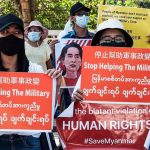
Myanmar, India, China, Thailand, Cambodia, Laos, and Indonesia, the current chair of the Association of Southeast Asian Nations (ASEAN), recently attended a secret meeting in New Delhi to discuss the ongoing crisis in junta-led Myanmar. This meeting was the second in a “Track 1.5” dialogue series that began in Thailand last month. The participants of the meeting could not be identified as the gathering was confidential.
The Indian think-tank that hosted the meeting reportedly discussed reducing violence, creating space for dialogue, and delivering humanitarian aid. The meeting aimed to de-escalate the crisis in Myanmar and complement the efforts of ASEAN, which has barred the military junta from attending official meetings until they implement their peace plan. In 2021, the junta had pledged to consider ASEAN’s suggestions, but has shown little willingness to do so.
The “Five-Point Consensus” is the only diplomatic process currently in play for Myanmar. It includes an immediate end to violence, dialogue among all concerned parties, the appointment of a special envoy, provision of humanitarian assistance by ASEAN, and a visit by the bloc’s special envoy to Myanmar to meet with all parties. The Indian think-tank’s meeting aimed to support these efforts and pave the way for peaceful negotiations between all parties involved.
The secrecy surrounding the New Delhi meeting highlights the delicate nature of the situation in Myanmar. While the military junta remains in power, protests continue to erupt across the country, and the economy has suffered. The international community has condemned the military’s actions and called for a peaceful resolution to the crisis. The involvement of China, India, and ASEAN countries in the dialogue series demonstrates the importance of Myanmar’s stability in the region.
The meeting’s location in New Delhi is significant as India has historically maintained close ties with Myanmar, and both countries share a long border. India has been cautious in its response to the crisis, calling for restraint from all parties and encouraging peaceful negotiations. The Indian government has also provided humanitarian aid to Myanmar.
In another important development, former United Nations chief Ban Ki-Moon landed in Naypyidaw on a surprise visit and urged the military generals to reduce violence and engage in constructive dialogue with all stakeholders. The junta is reportedly planning to hold elections in Myanmar in November, even as Aung San SuuKyi’s National League for Democracy (NLD) has been dissolved, which stood for democracy in Myanmar. The Track 1.5 dialogue participants discussed effectively implementing ASEAN’s ‘5-point consensus’ on Myanmar, enunciated in April 2021, two months after the coup. All member countries have agreed to continue this parallel dialogue track.
Representatives of think tanks and academia who participated in the Track 1.5 dialogueagreed that there is a need for a regional coordinated approach to combat transnational crimes. India has traditionally opposed all forms of societal violence and terrorism, whether by a group of people or a state. Lt Gen Kalita, attending the diamond jubilee celebrations of HQ 101 area in Shillong, stated that it is the army’s responsibility to ensure that no one carrying weapons enters Indian territory. When fighting occurs near the border areas, unarmed persons from Myanmar flee to India to avoid the conflict. Only unarmed persons are allowed to enter the Indian side, he said.
While India has been cautious in its response to the crisis, it has continued to maintain close ties with Myanmar and has been providing humanitarian aid to the country. India’s involvement in the Track 1.5 dialogue series demonstrates its engagement with efforts for a peaceful resolution to the crisis and supporting the stability of the region.
During the Track 1.5 dialogue, India and ASEAN discussed the current situation in Myanmar, reducing violence, countering transnational crimes, national reconciliation, and delivering humanitarian aid. The countries agreed that humanitarian aid to Myanmar needs to be expedited and that Myanmar’s crucial role in combating transnational crimes needs to be supported. The dialogue also called for the reduction of violence by all sides and creating political space for dialogue.
In conclusion, the crisis in Myanmar remains a significant challenge, but the Track 1.5 dialogue series and the Five-Point Consensus provide a path forward for peaceful negotiations and a resolution to the crisis. (IPA Service)
The post Regional Powers Discuss Myanmar Crisis In A Secret Meeting Hosted By India first appeared on IPA Newspack.


